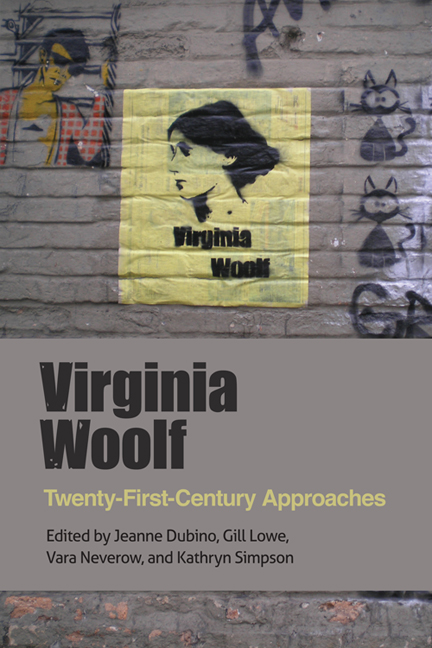Book contents
- Frontmatter
- Contents
- Acknowledgements
- Contributors
- Abbreviations
- Introduction
- PART ONE Self and Identity
- 1 ‘I am fast locked up’, Janus and Miss Jan: Virginia Woolf's 1897 Journal as Threshold Text
- 2 Elusive Encounters: Seeking out Virginia Woolf in Her Commemorative House Museum
- PART TWO Language and Translation
- PART THREE Culture and Commodification
- PART FOUR Human, Animal, and Nonhuman
- PART FIVE Genders, Sexualities, and Multiplicities
- Index
2 - Elusive Encounters: Seeking out Virginia Woolf in Her Commemorative House Museum
from PART ONE - Self and Identity
Published online by Cambridge University Press: 05 August 2016
- Frontmatter
- Contents
- Acknowledgements
- Contributors
- Abbreviations
- Introduction
- PART ONE Self and Identity
- 1 ‘I am fast locked up’, Janus and Miss Jan: Virginia Woolf's 1897 Journal as Threshold Text
- 2 Elusive Encounters: Seeking out Virginia Woolf in Her Commemorative House Museum
- PART TWO Language and Translation
- PART THREE Culture and Commodification
- PART FOUR Human, Animal, and Nonhuman
- PART FIVE Genders, Sexualities, and Multiplicities
- Index
Summary
Listless is the air in an empty room, just swelling the curtain; the flowers in the jar shift.
One fibre in the wicker armchair creaks, though no one sits there.
Virginia Woolf, Jacob's RoomWriters, of course, live on through their work long after their material demise. Their thoughts and ideas are kept vividly alive through the enduring medium of their words set down on the page. This phenomenon is richly represented in the case of Virginia Woolf, whose work is the subject of perpetual re-discovery and re-interpretation far beyond the chronological or geographical confines of her physical or temporally bound existence. In the twenty-first century, we dialogue with Woolf in a myriad of ways: intellectually, artistically, politically, poetically. Not only are her ideas astonishingly à propos more than seventy years after her death, her very writing style is thrilling and quickening. Reading Virginia Woolf – unfailingly – makes me feel more alive.
Yet however animated or animating a posthumous text, readers who enjoy or are intrigued by a writer's language or ideas are often tempted, it seems, by the possibility of an authorial encounter of a more material kind. The growing number of people undertaking literary pilgrimages, seeking a tangible link with a writer's lived past, is indicative of a desire for an exchange beyond a meeting of minds. Writers die, but the artefacts which they handled, the houses which they inhabited, the contexts in which they set their work, frequently endure. Such physical remnants of another's past offer themselves as possible sources of consolidation or illumination – of a more proximal attunement to the other's life and creative process. Visitors flock to Abbotsford, in pursuit of Scott; to Haworth, in search of the Brontës; to Hampstead and Rome, desirous of a glimpse of Keats.
But an investigation into the intimate sites and the surviving accoutrements of another's lived past is a highly charged affair. Often characterised as recreational and undertaken with a careless sense of ease, visiting a commemorative house has the capacity to enthrall, rather than to entertain; to surprise and disarray, rather than to amuse. Readers and writers customarily encounter one another through the shared forum of the published text, in an intended collaboration, in the immaterial realm of the intellect or the imagination.
- Type
- Chapter
- Information
- Virginia WoolfTwenty-First-Century Approaches, pp. 34 - 48Publisher: Edinburgh University PressPrint publication year: 2014



